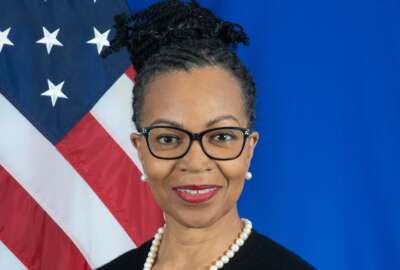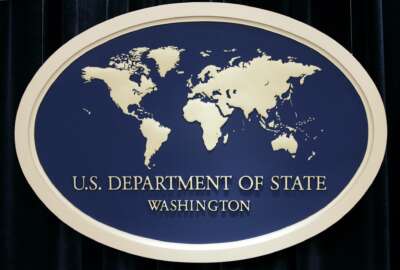State Dept. highlights workforce goals as part of ‘historic’ modernization strategy
The State Department is building up its cybersecurity and IT expertise, and addressing workforce morale issues as part of a sweeping modernization of the agency.
The State Department is building up its cybersecurity and IT expertise, and addressing workforce morale issues as part of a sweeping modernization of the agency.
Secretary of State Antony Blinken, speaking Wednesday at the Foreign Service Institute, launched a strategy to modernize the department in the face of emerging threats.
The Modernization of American Diplomacy strategy pivots the department to focus on cybersecurity and emerging technology as part of its day-to-day diplomatic mission.
The strategy also overhauls the department’s thinking on recruitment and retention, with a particular focus on overcoming its longstanding challenges promoting diverse talent through its upper ranks.
“We have a window before us to make historic, lasting change, and we’re determined to seize it,” Blinken said.
The first pillar of the strategy calls on the department to build capacity and expertise in areas critical to national security, with a particular focus on climate, global health, economics, multilateral diplomacy, cybersecurity and emerging technology.
Blinken said these policy areas reflect the Biden administration’s priorities and mark a “significant reorientation of U.S. foreign policy.”
As part of this effort, the department will launch a Bureau for Cyberspace and Digital Policy, headed by an ambassador at large, and will name a new special envoy for critical and emerging technology.
Blinken said both of these leadership positions will report to Deputy Secretary Wendy Sherman for at least a year. Meanwhile, the department will bring in additional STEM-specialized talent into the civil and Foreign Service.
Blinken said this strategic realignment will position the department to make cybersecurity a top priority for diplomats. He said it would also emphasize the department’s role in shaping international standards and norms for emerging technology.
“We want to prevent cyberattacks that put our people, our networks, companies and critical infrastructure at risk,” Blinken said.
The department is asking for a 50% increase in its IT budget for fiscal 2022, and is also focused on improving its data analytics capabilities. The department launched its first Enterprise Data Strategy this month.
“The department has vast and diverse datasets. But we haven’t done a good enough job making data available to you in a timely and useful way to help you make missions or management decisions more effectively. We’re changing that,” Blinken said.
Addressing workforce retention challenges
Another pillar of the plan focuses on recruiting and retaining a diverse workforce, while also addressing common challenges that have caused some employees to leave the department.
“We need to empower employees and create more opportunities for advancement so mid-career professionals don’t have to make painful choices about whether to stay or leave,” Blinken said.
Modernization of the department will address common retention challenges, which include Foreign Service family members finding jobs or maintaining careers overseas, the toll put on staff at hardship posts, a narrowed pipeline for promotions and employees’ fears of discrimination in a foreign post over their race, gender, disability or sexual orientation.
“No one at the State Department expects their jobs to be easy. That’s not why we’re here. But many have asked whether it has to be quite this hard,” Blinken said.
Blinken said the department will keep workplace flexibilities like telework in place beyond the COVID-19 pandemic, and its Global Talent Management Bureau is also standing up a retention unit to better understand why employees consider leaving government service.
Meanwhile, the department continues to confront anomalous health incidents that colloquially have been referred to as “Havana Syndrome.” Cases have been reported since 2016, and the head of the Health Incident Response Task Force, Amb. Pamela Spratlen, stepped down last month.
“We will leave no stone unturned to get to the bottom of what and who is behind these incidents,” Blinken said.
The State Department’s fiscal 2022 budget request would increase spending on the department and USAID by 10%, and would enable the largest hiring campaign in a decade. Blinken said Congress, so far, has “responded favorably” to this request.
Blinken said the department will also increase the number of Senior Executive Service-level positions in its civil service by 10%, the first significant increase in more than a decade.
Blinken earlier this year named former Ambassador to Malta Gina Abercrombie-Winstanley as the department’s first chief diversity and inclusion officer, an elevated position that sits on promotion boards at the department.
Abercrombie-Winstanley and her team will soon release their preliminary strategic plan, and will finalize the plan early next year.
Blinken said Abercrombie-Winstanley is already establishing a demographic baseline to measure progress in hiring a diverse pool of talent, and securing funding for paid internships “so you don’t have to come from a well-off family to afford the opportunity.”
Blinken said the department has lifted more than half of its current assignment restrictions, a practice that bars some employees from serving in a particular country or working on issues related to that country, regardless of security clearance status.
Critics have called the practice discriminatory, and Reps. Ted Lieu (D-Calif.), Joaquin Castro (D-Texas), Andy Kim (D-N.J.) and Chrissy Houlahan (D-Pa.) introduced a bill last month that would restrict the use of assignment restrictions.
The department is also gearing up to provide “training float” within its workforce, a concept former Secretary Colin Powell envisioned for diplomats.
In practice, the training float will ensure a set number of employees undergo professional training at any given time, without sacrificing readiness at their posts.
Blinken said the department is also exploring workforce exchanges and job rotation programs with other agencies, as well as within the private sector and Congress.
Another pillar of the will encourage department leaders to make “domestic travel and engagement” a priority by holding listening sessions with employees, as well as state and local governments and private-sector partners.
“We talk and we hope they listen, we got to do more listening,” Blinken said.
Blinken said the department is also conducting several internal reviews over the evacuation of Afghanistan. Blinken said it was a “remarkable achievement” that the U.S. evacuated more than 120,000 Afghans, Americans and foreign partners in a matter of days, but also recognized the operation was “incredibly difficult” and fraught with challenges.
“We learned a lot in a short period of time. We learned it the hard way. We learned by doing now, we owe it to ourselves, to our Afghan friends and partners, to the future State Department employees who might find themselves facing a similar challenge one day, to capture all that we learned, to study it, to apply it, to preserve it in a way that it enhances our future planning and helps us prepare better for future contingencies.” Blinken said.
Copyright © 2024 Federal News Network. All rights reserved. This website is not intended for users located within the European Economic Area.
Jory Heckman is a reporter at Federal News Network covering U.S. Postal Service, IRS, big data and technology issues.
Follow @jheckmanWFED






